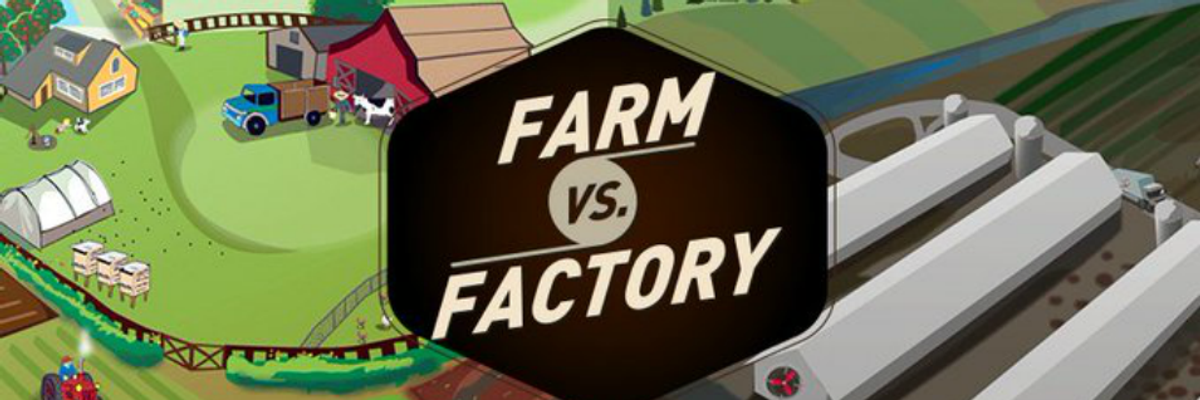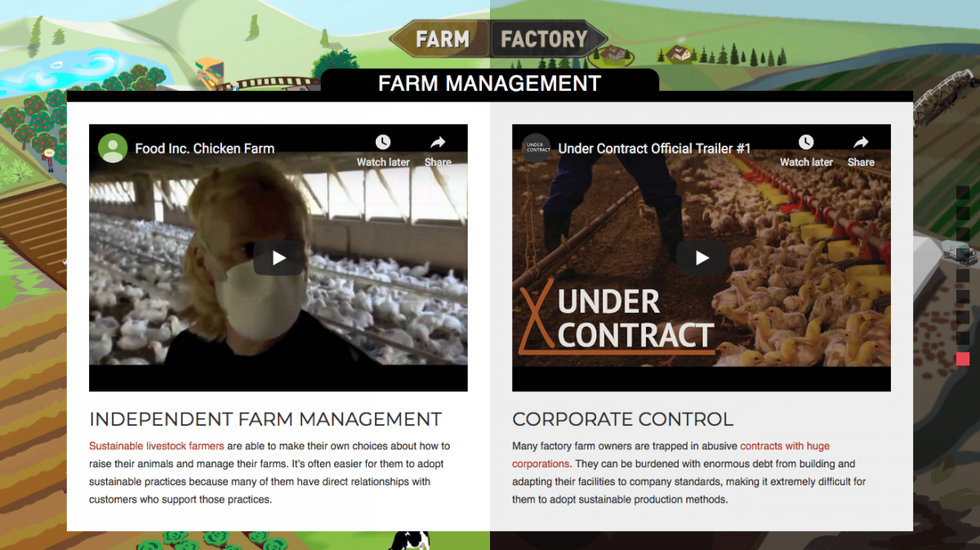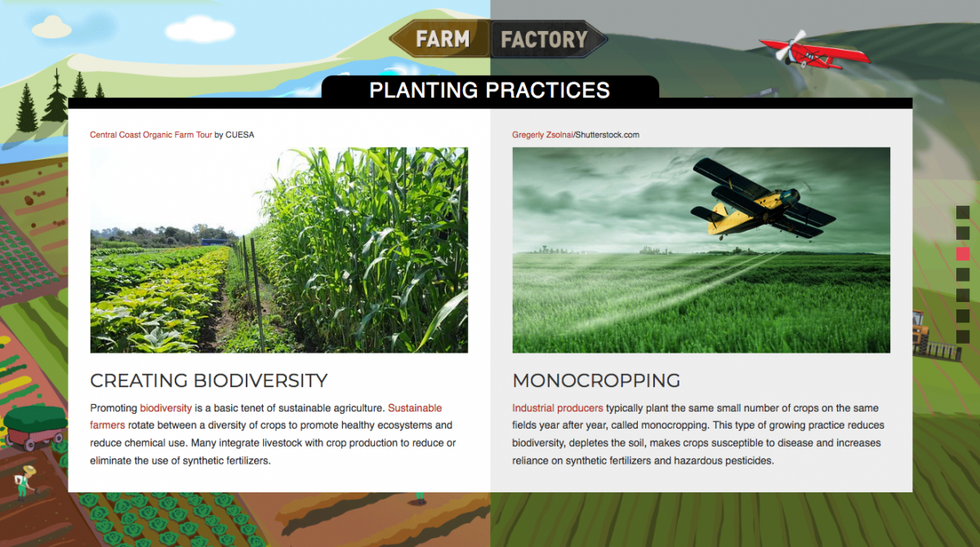
A new website by Food & Water Watch details the differences between sustainable and industrial farming. (Image: farmvsfactory.org)
To Combat Dishonest Marketing, New 'Farm vs. Factory' Website Contrasts Industrial and Sustainable Agriculture
The educational website was launched by U.S. nonprofit Food & Water Watch, which campaigns to outlaw factory farming nationwide.
The national nonprofit Food & Water Watch on Friday launched its "Farm vs. Factory" website, an interactive tool that aims to shed light on the differences between sustainable and industrial agriculture.
"Clever marketing and sneaky messaging have made it difficult to differentiate between small scale farming and industrial animal production," the group said in a statement. "This website maps out the characteristics, proliferation, and history of industrial agriculture while showcasing what sustainable farms do differently."
\u201cWe\u2019re excited to show you our new interactive "Farm Vs. Factory" tool! \n\nIt's a great way to understand what's happening behind the scenes with food production. Take a look: https://t.co/UAcROv1ly4 #banfactoryfarms\u201d— Food & Water Watch (@Food & Water Watch) 1571407747
Last year, Food & Water Watch began a nationwide campaign to outlaw factory farms and released a report (pdf) detailing how "these operations produce enormous volumes of waste, pollute the air and water, exploit workers, harm animal welfare, fuel antibiotic resistance and climate change, and harm the rural communities they are purported to benefit."
The new farm vs. factory website features side-by-side comparisons of each approach to agriculture, with sections focused on animals, crops, and humans. Each comparison features photos or videos.
The animals section describes living conditions--pasture-raised compared with extreme confinement--as well as environmental and community impacts, antibiotic use, animal well-being, and farm management.
The crops section highlights differences in planting practices, pest control, fertilizer use, genetically modified (GMO) crops technology, and soil health.
"Sustainable farmers protect soil by rotating crops and avoiding pesticides and other soil pollutants," the website explains. However, with industrial operations, "the same crops are often grown on wide expanses of land year after year, leading to loss of soil nutrients."
The "food & you" section addresses the question: "How would a more sustainable food system look different from our current industrial model?"
To help readers figure that out, the section explores human nutrition (healthful food versus poor food quality), food distribution, farmer workers, and political influence--at which point Food & Water Watch encourages users to "take action today to help support sustainable farmers!"
The website also features a resources page where those interested can learn more about the impacts of industrial agriculture as well as how to get involved in grassroots political efforts to tackle food and water issues and outlaw factory farming.
The resources page links to a TED Talk about "fighting factory farms through legal means" by Michele Merkel, the group's co-director of food and water justice.
Watch:
An Urgent Message From Our Co-Founder
Dear Common Dreams reader, The U.S. is on a fast track to authoritarianism like nothing I've ever seen. Meanwhile, corporate news outlets are utterly capitulating to Trump, twisting their coverage to avoid drawing his ire while lining up to stuff cash in his pockets. That's why I believe that Common Dreams is doing the best and most consequential reporting that we've ever done. Our small but mighty team is a progressive reporting powerhouse, covering the news every day that the corporate media never will. Our mission has always been simple: To inform. To inspire. And to ignite change for the common good. Now here's the key piece that I want all our readers to understand: None of this would be possible without your financial support. That's not just some fundraising cliche. It's the absolute and literal truth. We don't accept corporate advertising and never will. We don't have a paywall because we don't think people should be blocked from critical news based on their ability to pay. Everything we do is funded by the donations of readers like you. Will you donate now to help power the nonprofit, independent reporting of Common Dreams? Thank you for being a vital member of our community. Together, we can keep independent journalism alive when it’s needed most. - Craig Brown, Co-founder |
The national nonprofit Food & Water Watch on Friday launched its "Farm vs. Factory" website, an interactive tool that aims to shed light on the differences between sustainable and industrial agriculture.
"Clever marketing and sneaky messaging have made it difficult to differentiate between small scale farming and industrial animal production," the group said in a statement. "This website maps out the characteristics, proliferation, and history of industrial agriculture while showcasing what sustainable farms do differently."
\u201cWe\u2019re excited to show you our new interactive "Farm Vs. Factory" tool! \n\nIt's a great way to understand what's happening behind the scenes with food production. Take a look: https://t.co/UAcROv1ly4 #banfactoryfarms\u201d— Food & Water Watch (@Food & Water Watch) 1571407747
Last year, Food & Water Watch began a nationwide campaign to outlaw factory farms and released a report (pdf) detailing how "these operations produce enormous volumes of waste, pollute the air and water, exploit workers, harm animal welfare, fuel antibiotic resistance and climate change, and harm the rural communities they are purported to benefit."
The new farm vs. factory website features side-by-side comparisons of each approach to agriculture, with sections focused on animals, crops, and humans. Each comparison features photos or videos.
The animals section describes living conditions--pasture-raised compared with extreme confinement--as well as environmental and community impacts, antibiotic use, animal well-being, and farm management.
The crops section highlights differences in planting practices, pest control, fertilizer use, genetically modified (GMO) crops technology, and soil health.
"Sustainable farmers protect soil by rotating crops and avoiding pesticides and other soil pollutants," the website explains. However, with industrial operations, "the same crops are often grown on wide expanses of land year after year, leading to loss of soil nutrients."
The "food & you" section addresses the question: "How would a more sustainable food system look different from our current industrial model?"
To help readers figure that out, the section explores human nutrition (healthful food versus poor food quality), food distribution, farmer workers, and political influence--at which point Food & Water Watch encourages users to "take action today to help support sustainable farmers!"
The website also features a resources page where those interested can learn more about the impacts of industrial agriculture as well as how to get involved in grassroots political efforts to tackle food and water issues and outlaw factory farming.
The resources page links to a TED Talk about "fighting factory farms through legal means" by Michele Merkel, the group's co-director of food and water justice.
Watch:
The national nonprofit Food & Water Watch on Friday launched its "Farm vs. Factory" website, an interactive tool that aims to shed light on the differences between sustainable and industrial agriculture.
"Clever marketing and sneaky messaging have made it difficult to differentiate between small scale farming and industrial animal production," the group said in a statement. "This website maps out the characteristics, proliferation, and history of industrial agriculture while showcasing what sustainable farms do differently."
\u201cWe\u2019re excited to show you our new interactive "Farm Vs. Factory" tool! \n\nIt's a great way to understand what's happening behind the scenes with food production. Take a look: https://t.co/UAcROv1ly4 #banfactoryfarms\u201d— Food & Water Watch (@Food & Water Watch) 1571407747
Last year, Food & Water Watch began a nationwide campaign to outlaw factory farms and released a report (pdf) detailing how "these operations produce enormous volumes of waste, pollute the air and water, exploit workers, harm animal welfare, fuel antibiotic resistance and climate change, and harm the rural communities they are purported to benefit."
The new farm vs. factory website features side-by-side comparisons of each approach to agriculture, with sections focused on animals, crops, and humans. Each comparison features photos or videos.
The animals section describes living conditions--pasture-raised compared with extreme confinement--as well as environmental and community impacts, antibiotic use, animal well-being, and farm management.
The crops section highlights differences in planting practices, pest control, fertilizer use, genetically modified (GMO) crops technology, and soil health.
"Sustainable farmers protect soil by rotating crops and avoiding pesticides and other soil pollutants," the website explains. However, with industrial operations, "the same crops are often grown on wide expanses of land year after year, leading to loss of soil nutrients."
The "food & you" section addresses the question: "How would a more sustainable food system look different from our current industrial model?"
To help readers figure that out, the section explores human nutrition (healthful food versus poor food quality), food distribution, farmer workers, and political influence--at which point Food & Water Watch encourages users to "take action today to help support sustainable farmers!"
The website also features a resources page where those interested can learn more about the impacts of industrial agriculture as well as how to get involved in grassroots political efforts to tackle food and water issues and outlaw factory farming.
The resources page links to a TED Talk about "fighting factory farms through legal means" by Michele Merkel, the group's co-director of food and water justice.
Watch:



